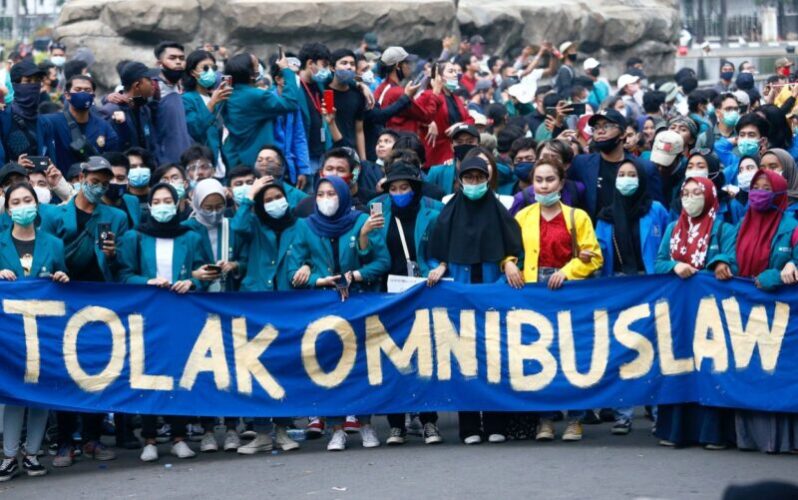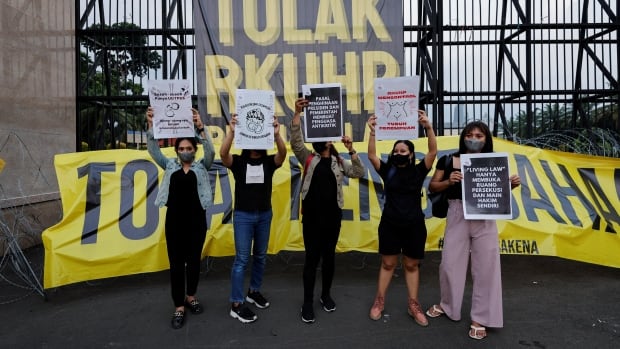On 6 December 2022, the Indonesian Parliament passed the draconian Criminal Code Act, which completely overhauled the Criminal Code. As per the new Act, adultery and cohabitation would be illegal with punishments of 6 months to a year in prison. The new criminal code bans the promotion of contraception, spreading communism, criticizing the sitting President, or vice president, and religious blasphemy. It also severely restricts access to abortion for pregnant women. The Act still may be many years from being implemented but has been severely criticized for its draconian nature by Civil Liberty activists in Indonesia.
Revising the Criminal Code
There has been a movement to completely rehaul the criminal code bill for a long time in Indonesia. The original Criminal Code was passed during Dutch rule. Many have called for a criminal code that reflects the will of the Indonesian people along with their values. This is the source of the conflict.
Role of the MUI
Indonesian Civil Society has always been influenced by religion. Progressive forces cite the humanitarian side of religion, and conservative elements try to advance the traditional order. Since the late 1990s, conservative elements have become more politically powerful.
Recently, the conservative elements of civil society have been able to lobby for a draconian Criminal Code. The rise of this branch goes back to the 1990s. In campaigning for the fall of Suharto back in the late 1990s, civil society groups campaigned on principles of democracy and populism. This involved a coalition between religious traditionalists and progressive elements. The traditionalist voices were initially very diverse, reflecting the plurality of religious practices in Indonesia. They were united in their call for a return to traditional values, a rejection of authoritarian elites, and a commitment to the electoral process.
In the early 2000s, the Majelis Ulama Indonesia (Council of Indonesian Islamic Scholars, known as MUI) became a leading voice for religious traditionalists. The MUI is Indonesia’s top Muslim Clerical body. It was founded in 1975 to aid the Suharto regime. Suharto used the MUI to delegitimize popular struggles by political Islamists and leftists. After the fall of Suharto, the MUI adapted to be more populist. Against the tradition of religious practice being mixed into local practices, the MUI promoted a more fundamentalist version, which was also seen as universal. They could speak to values from different parts of Indonesia. In a growing frustration against corruption in government, the MUI’s appeal to moral authority and character was popular with the people. The organization has issued fatwa’s against other versions of Islam calling for a homogeneous version. The MUI has also issued fatwas condemning the LGBT community, abortion, and extramarital sex. These fatwas have influenced public opinion and have been very influential in political circles.
Indonesia: Omnibus “killing us slowly”, police-protestors clashes intensify
The 2014 election and the 2019 election were very polarizing. The ex-son-in-law of Suharto, Prabowo Subianto, ran for President both times on a platform of reactionary populism. Following in line with the election of Donald Trump in the United States. He promised to fight for traditional and religious values, take a stand against elites and corrupt journalists, and “Make Indonesia great again.” Prabowo lost the election, prompting riots by his supporters amidst conspiracies of the elections being fixed.
Despite their loss, Prabowo’s campaign affected the body politic. In September 2019, the Parliament approved the bill to revise the Criminal Code. The bill was introduced in 2015 after the 2014 election and was made to appeal to the reactionary elements that Prabowo courted. In 2019, Yasonna Laoly, the Minister of Law and Human Rights, supported a new bill completely. The bill came in parallel with an anti-corruption bill, changes to the labour code, and agrarian reforms.
Response in 2019
Both Bills were met with student-led mass protests in 2019. The anti-corruption bill was called politically motivated, as it reduced the autonomy of the Corruption Eradication Commission and gave politicians more power. The Criminal Code Bill was seen as a draconian step that undermined the democratic values of Indonesian society.
 University students hold a sign reading “Refuse Omnibuslaw” during a protest against the government’s labor reforms bill in Jakarta, Indonesia, October 16, 2020. REUTERS/Ajeng Dinar Ulfiana
University students hold a sign reading “Refuse Omnibuslaw” during a protest against the government’s labor reforms bill in Jakarta, Indonesia, October 16, 2020. REUTERS/Ajeng Dinar Ulfiana
Internationally, the Indonesian protests were overshadowed by the Hong Kong protests and the anti-CAA protests. Media coverage was restricted to the ban on extra-marital sex and missed out on the broader issues of the growing authoritarian nature of the bills. Protests called for changes to all of the articles in the Bills that worked against the autonomy of the Corruption Eradication Commission, workers’ rights, farmers’ rights, and civil liberties. The protests were very violent with many confrontations between the protesters and the police. Hundreds were injured.
2022 protests
In September 2022, student-led protests again erupted in Indonesia following rumours of an amendment to the constitution that removed term limits for the President and postponement of the 2024 elections. The protests initially were against the current government, though after the rumours were dispelled, the protests continued. Protesters shifted to focus on general discontent in light of the rising costs of living.
In December, the Criminal Act came to light again. Most English media has focused on elements of the Act that deal with sexuality, but this coverage does not take into consideration how comprehensive the change is. The change has been sold to the people as being respectful of Indonesian values but disregards the pluralistic culture of the Indonesian people and their religious beliefs. Under the guise of nationalism, the Indonesian parliament has only tried to protect the political class by criminalizing its citizenry and its ability to dissent.
Indonesia has the world’s largest Muslim population and has been home to many variations in the practice of that religion. The rise of a homogeneous version of that identity that sweeps away diversity right now threatens the democratic fabric of society. Updating the Criminal Code to reflect Indonesian values sounds good in theory, but the new version reproduces one of the worst aspects of the colonial legacy, an authoritarian state. Conservative forces are now using that state to enforce their opinions over the whole of society.
The writer is a mathematician and political observer based in Bangalore.



























